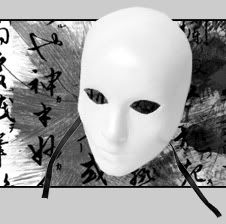3.14.2007
From my Art & Spirituality journal.
My senior project is centered around a girl's simultaneous experience of lycanthropy and adolescence. To this end I've had to do a lot of research into werewolf myths, which involves watching and reading a lot of horror movies and books. (My life is so hard.)
Among other things, one of the major themes I'd like to explore is the relationship between the mind and the body, particularly the division between the intellectual and the sexual. One of the major themes of most werewolf myths is a sense of mind-body dualism, particularly a Gnostic / Manichean duality in which the body represents and constitutes the base, animalistic material nature. In this paradigm, the body, as seen in the "beast" form of the wolf-man, must be subdued if possible, and destroyed if necessary, as an impediment to the essential goodness of the human. To be good is to be disassociated from the physical.
Typically, this kind of "matter is evil" philosophy tends to be fairly misogynistic, since women are supposed to be more rooted to their physical bodies than men. Women are generally tied to their reproductive systems, their menstrual cycles and their pregnancies, in a way that men are not. Women therefore tend to be equated with "The Physical," symbolically, and therefore with Evil. In many ways, for women to be considered fully human, they have to overcome their femaleness. You can interpret werewolf myths, in that sense, as The Intellectual Man overcoming or being overcome (and destroyed) by his lunarly-controlled Physical Woman Side.
In particular, a lot of Western spiritual systems tend to portray sexuality as the enemy of spirituality, especially the more intellectual or systematic the religion tends to be. I learned that lesson early as an evangelical teenager, where my job as a girl was to be the gatekeeper of sexuality. I, as a Good Christian Girl, was supposed to focus on allowing or disallowing boys access to my body based on whether he said the Magic Words (something along the lines of "Will You Marry Me?") Sexuality was something to be channeled into Approved Modes of Expression, which were mainly limited to monogamous heterosexual marriage. The idea that I might want something different, or anything at all, on my own terms, particularly not the idea that I might not want boys at all, was never presented as an option. Since I, as a female person, represented sexuality, it was all the more my burden to overcome it to be considered truly pure and spiritual.
This, not to put too blunt a point on it, is pure bullshit.
To this end, much of the story is meant to question this duality of Mind Is Good, Body Is Bad. The heroine fails at all the obvious solutions-- she can't simply deny the reality of her wolf self, she can't control or subdue her wolf self without damage to her whole self, and she can't entirely throw herself over to being totally wolfy without doing injury to her human self as well. She, as a werewolf, is neither entirely human nor entirely wolf, and living as one or the other therefore makes no sense. The solution, for her, is not to try to compartmentalize and hierarchalize the components of her nature, but to integrate them into a working whole. The body and the mind, the right brain and the left brain, the sexual and the spiritual, are not enemies, nor are they even necessarily separate parts of a larger whole, but different lenses through which to view the world and different modes in which to act.


